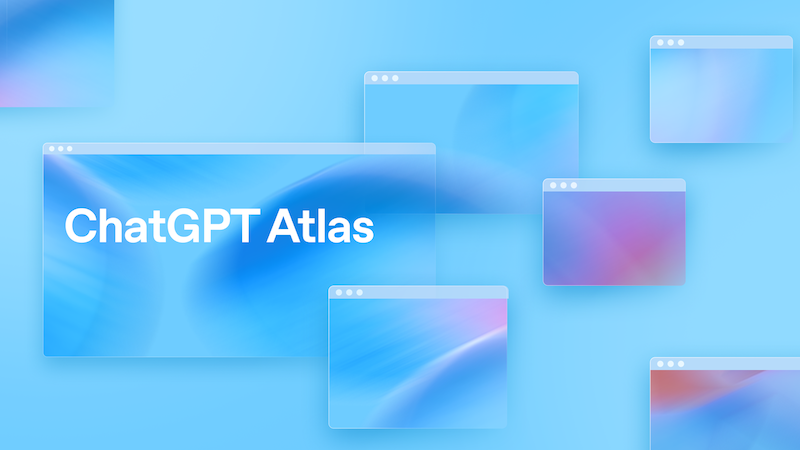OpenAI has launched ChatGPT Atlas, a new web browser that integrates the ChatGPT conversational AI directly into the browsing experience.
The company says Atlas represents “a rare moment to rethink what it means to use the web”, following last year’s introduction of search capabilities inside ChatGPT. Those features, according to OpenAI, quickly became some of the most widely used on the platform.
“With Atlas, ChatGPT can come with you anywhere across the web – helping you in the window right where you are, understanding what you’re trying to do, and completing tasks for you, all without copying and pasting or leaving the page,” the company says in a blog post announcing the launch.
The browser allows users to carry ChatGPT’s memory across sites and sessions. Conversations can reference prior chats, documents, or web pages to assist with ongoing tasks.
Yogya Kalra, a college student and early tester of ChatGPT Atlas, says: “During lectures, I like using practice questions and real-world examples to really understand the material.
“I used to switch between my slides and ChatGPT, taking screenshots just to ask a question. Now ChatGPT instantly understands what I’m looking at, helping me improve my knowledge checks as I go.”
Browser memory and privacy controls
OpenAI says Atlas includes optional “browser memories” that allow ChatGPT to recall context from sites a user visits. This can help with tasks such as summarizing job listings or compiling research from recent browsing sessions. Users can view, archive, or delete these memories at any time, and clearing browsing history removes any associated data.
Privacy controls are a central feature of Atlas. Users can disable ChatGPT’s visibility on specific sites, clear browsing history, or open incognito windows that temporarily log the user out of ChatGPT.
“Browser memories are private to your ChatGPT account and under your control,” the company says.
By default, OpenAI stated it does not use browsed content to train its models unless users opt in via settings.
Parental controls are also available in Atlas. If parents have set restrictions for ChatGPT, those settings will carry over automatically, and additional options are provided to disable browser memories or agent mode.
Agent mode and automation
One of Atlas’s headline features is agent mode, which enables ChatGPT to perform tasks directly within the browser. This mode allows the AI to interact with web pages, automate actions, and manage multi-step workflows.
“Imagine you’re planning a dinner party and you have a recipe in mind,” says OpenAI. “You can give the recipe to ChatGPT and ask it to find a grocery store, add all the ingredients to a cart, and order them to your house.”
Agent mode is launching in preview for Plus, Pro, and Business users. OpenAI described it as “an early experience” that may make mistakes on complex workflows but is being improved for reliability and speed.
The company said it has built multiple safeguards to ensure user safety when ChatGPT takes actions in a browser, including preventing code execution, file downloads, and access to other apps.
“It cannot run code in the browser, download files, or install extensions,” the company says. Additional precautions include pausing the agent when interacting with sensitive sites such as financial institutions.
OpenAI acknowledges that “ChatGPT’s agent capabilities still carry risk”, noting potential exposure to hidden malicious instructions embedded in web content. The company says it has conducted “thousands of hours of focused red-teaming” to identify vulnerabilities and that safeguards are designed to adapt to new threats as they arise.
Availability and next steps
ChatGPT Atlas is available now for macOS users across Free, Plus, Pro, and Go plans. It is also available in beta for Business accounts and, if enabled by administrators, for Enterprise and Education users. Versions for Windows, iOS, and Android are planned for release soon.
Users can download the browser from chatgpt.com/atlas, import bookmarks and passwords from their existing browser, and start using ChatGPT as an integrated assistant.
OpenAI says Atlas marks “a step toward a future where most web use happens through agentic systems – where you can delegate the routine and stay focused on what matters most”.
The company plans to expand Atlas with features including multi-profile support, improved developer tools, and greater integration with the ChatGPT Apps SDK.
“This is just the start,” OpenAI says. “We’ll be shipping new features and improvements frequently.”

